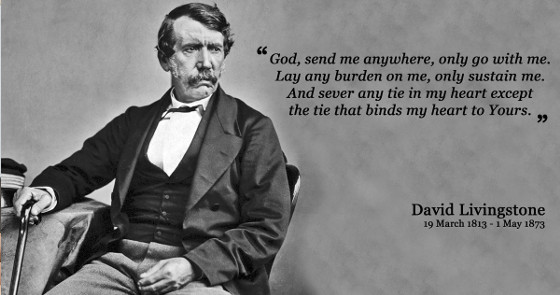
Who was David Livingstone?
David Livingstone was a 19th century, Scottish Presbyterian medical missionary, physician, abolitionist, explorer and philanthropist who was known for his "unwearied effort to evangelize the native races, to explore the undiscovered secrets, and to abolish the slave trade." [quote from his tombstone]. Some have likened him to Mother Teresa, Neil Armstrong and Abraham Lincoln all rolled into one!
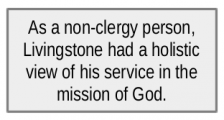 We have chosen to honor his legacy because as a non-clergy person, Livingstone had a holistic view of his service in the mission of God. He wrote, "[I am] not a dumpy sort of person with a Bible under his arms, [but someone] serving Christ when shooting a buffalo for my men or taking an observation, [even if some] will consider it not sufficiently or even at all missionary."
We have chosen to honor his legacy because as a non-clergy person, Livingstone had a holistic view of his service in the mission of God. He wrote, "[I am] not a dumpy sort of person with a Bible under his arms, [but someone] serving Christ when shooting a buffalo for my men or taking an observation, [even if some] will consider it not sufficiently or even at all missionary."
His pioneering work led to opening a road into the interior of Africa so that unreached peoples could be reached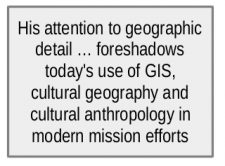 with the gospel. The African maps of his day showed vast unexplored areas with no roads, countries, landmarks or locations noted. Through his missional exploration, he redrew the map of his day to include dozens of countries in areas now known as South Africa, Rwanda, Angola and the Republic of the Congo. His attention to geographic detail as well as noting the connection of peoples to locations as a means of furthering his mission strategy foreshadows today's use of GIS technology, cultural geography and cultural anthropology in modern-day mission efforts.
with the gospel. The African maps of his day showed vast unexplored areas with no roads, countries, landmarks or locations noted. Through his missional exploration, he redrew the map of his day to include dozens of countries in areas now known as South Africa, Rwanda, Angola and the Republic of the Congo. His attention to geographic detail as well as noting the connection of peoples to locations as a means of furthering his mission strategy foreshadows today's use of GIS technology, cultural geography and cultural anthropology in modern-day mission efforts.
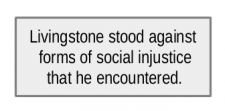 Abhorring the colonial mentality of the day, Livingstone stood against forms of social injustice that he encountered. Speaking to the indigenous peoples with respect, he was driven to expose the slave trade routes and to end the slave trade through what today would be called international economic development. As a result of his missional efforts, many other missionaries went to Central Africa where they established schools, health care and other facilities in those areas.
Abhorring the colonial mentality of the day, Livingstone stood against forms of social injustice that he encountered. Speaking to the indigenous peoples with respect, he was driven to expose the slave trade routes and to end the slave trade through what today would be called international economic development. As a result of his missional efforts, many other missionaries went to Central Africa where they established schools, health care and other facilities in those areas.
Livingstone also pioneered a gospel message that was communicated with respect for his audience. Rather than 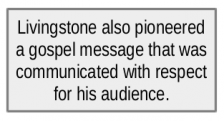 trying to force the tribal chiefs to accept Christianity (as some missionaries of his day attempted to do), he proclaimed the gospel in a non-confrontational manner. He communicated with his Christian audience through print publications such as "Missionary Travels and Researches in South Africa" (1857) and "Narrative of an Expedition to the Zambesi and Its Tributaries" (1864). His use of visual art in journals and writings to represent geographical features and artifacts that he discovered in his travels gives evidence of his use of current media to maximize the effect of his missional communication.
trying to force the tribal chiefs to accept Christianity (as some missionaries of his day attempted to do), he proclaimed the gospel in a non-confrontational manner. He communicated with his Christian audience through print publications such as "Missionary Travels and Researches in South Africa" (1857) and "Narrative of an Expedition to the Zambesi and Its Tributaries" (1864). His use of visual art in journals and writings to represent geographical features and artifacts that he discovered in his travels gives evidence of his use of current media to maximize the effect of his missional communication.
Thus we choose David Livingstone as an example of a life dedicated to service in the mission of God. Missional University encourages its students to emulate the passion and vision of David Livingstone to join in serving in the mission of God wherever God leads them in many different vocational capacities.
Livingstone Signature Series
( 9 credit hours)
The Livingstone Signature Series is the missional centerpiece of the degree programs at Missional University. Each degree program (Associate, Bachelor completion and Master's degrees) has a set of three courses that every student takes. These courses provide a foundational missional understanding:
What is the Mission of God in Our World and What is My Role in It?
A course that traces the theme of God's redemptive work in our world from Genesis to Revelation provides students with ways to see God at work all around them in everyday life.
How do I Share My Faith in a Dialogical, Non-Confrontational Way?
A course that teaches how to understand the worldview perspectives of people you meet through an engaging conversation that may lead to opportunities to share your Christian faith.
How do I Grow Spiritually, Help Other Christians to Grow Spiritually, and Join Other Believers in Engaging My Community?
A course that teaches Christians how to develop a personalized spiritual development process through the study of scripture, prayer and fellowship with other Christians that leads to engaging the needs of people around them together.
-
Sharing Your Faith Conversationally (3 credits)
The three courses below build on each other and will enable students to understand worldview and its application to sharing their faith with others conversationally. Through these courses, students will be introduced to ways to understand the viewpoints of others and develop appropriate missional approaches based upon knowing worldview perspectives.
COURSE FOR EACH DEGREE PROGRAM:
- Associate: Exploring Worldview in Christian Witness
- Beginning with a clear understanding of Christian mission, you will explore an approach to worldview study and a dialogical method to sharing your faith at a personal level. We will explore how understanding another person’s worldview through asking excellent questions will lead to a variety of approaches to evangelism in the context of diverse 21st century cultures.
- Bachelor: Worldview for Christian Witness
- This class will enable you to develop an ethnographic approach to understanding the worldviews of non-Christians. You will create an ethnography based on personal interviews focused on a specific cultural group you wish to explore. This ethnography will lead to a variety of approaches for evangelism in the context of diverse 21st century cultures.
- Master's: Integrating Worldview in Christian Witness
- Knowing your people is essential to the process of developing missional ministry. In this class you will develop a full ethnography incorporating both worldview and anthropological insights for the purpose of launching mission amongst unreached and least reached people groups..
-
Understanding the Mission of God in this World (3 credits)
The three courses below build on each other and will enable students to understand the redemptive narrative that spans the Scripture from Genesis to Revelation. Through these courses, students will be introduced to the missionary nature of God, how He has been at work through human history, and ways in which God uses believers in His mission.
COURSE FOR EACH DEGREE PROGRAM:
- Associate: Exploring the Mission of God
- This survey of Missio Dei , the mission of God, explores salvation history through the redemptive vision of God. The student will learn how God is reconciling all of creation unto himself in the person and work of Jesus Christ. Students will also observe God at work through His people in mission.
- Bachelor: Introduction to Missional Theology
- This course examines the biblical theological foundations of God's plan for global redemption throughout the Old and New Testament. The student will explore the eternal purpose of God for humanity, the state of those who have not heard the gospel, and the application of the missional mandate to various cultures.
- Master's: Biblical Theology of Mission
- This course investigates the biblical theology of mission. The student will analyze three distinct but interrelated areas: The biblical and theological foundations of mission; the Kingdom of God as the theme of mission; and progressive revelation throughout salvation history. The student will be able to construct his/her own mission theological framework.
-
Growing Spiritually While Serving in the Mission of God (3 credits)
The courses below teach Christians how to develop a personalized spiritual development process through the study of scripture, prayer and fellowship with other Christians that leads to engaging the needs of people around them together.
COURSE FOR EACH DEGREE PROGRAM:
- Associate: Introduction to Missional Spirituality
- This course explores the spiritual dimension of missional engagement in the post-Christendom world. Students will discover practical and creative ways of deepening their personal spirituality allowing more engagement with not-yet Christians and the development of authentic missional community. Resources will include readings, video interviews with practitioners, creative spiritual practices, real-life experimentation and weekly Q & A reports.
- Bachelor: Mission-Shaped Spirituality and Soul Care
- This course explores the spiritual dimension of missional engagement in the post-Christendom world. Students will create a personal spiritual development (or soul care) plan for their selves, their team and engaging a wider community. Resources will include readings, video interviews with practitioners, creative spiritual practices, and the development of a spiritual development plan.
- Master's: Integrating Spirituality with Missionality
- Students will assess different approaches to integrating spirituality with missionality in current and past literature. They will explore various forms of spiritual development and soul-care that encourage participants in both their spiritual depth and missional practice. Students will experience creative spiritual practices and develop customized spiritual development plans for their missional context.
